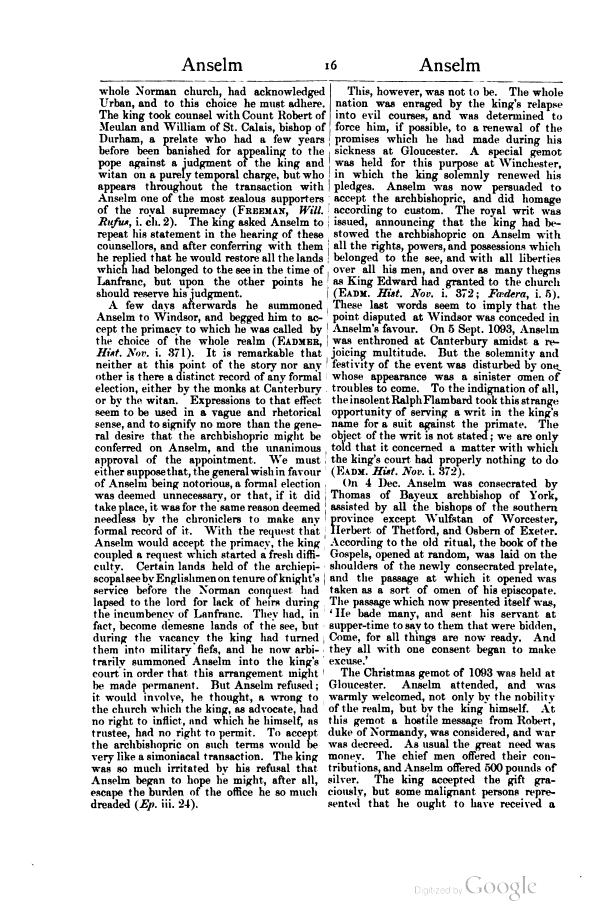whole Norman church, had acknowledged Urban, and to this choice he must adhere. The king took counsel with Count Robert of Meulan and William of St. Calais, bishop of Durham, a prelate who had a few years before been banished for appealing to the pope against a judgment of the king and witan on a purely temporal charge, but who appears throughout the transaction with Anselm one of the most zealous supporters of the royal supremacy (Freeman, Will. Rufus, i. ch. 2). The king asked Anselm to repeat his statement in the hearing of these counsellors, and after conferring with them he replied that he would restore all the lands which had belonged to the see in the time of Lanfranc, but upon the other points he should reserve his judgment.
A few days afterwards he summoned Anselm to Windsor, and begged him to accept the primacy to which he was called by the choice of the whole realm (Eadmer, Hist. Nov. i. 371). It is remarkable that neither at this point of the story nor any other is there a distinct record of any formal election, either by the monks at Canterbury or by the witan. Expressions to that effect seem to be used in a vague and rhetorical sense, and to signify no more than the general desire that the archbishopric might be conferred on Anselm, and the unanimous approval of the appointment. We must either suppose that, the general wish in favour of Anselm being notorious, a formal election was deemed unnecessary, or that, if it did take place, it was for the same reason deemed needless by the chroniclers to make any formal record of it. With the request that Anselm would accept the primacy, the king coupled a request which started a fresh difficulty. Certain lands held of the archiepiscopal see by Englishmen on tenure of knight's service before the Norman conquest had lapsed to the lord for lack of heirs during the incumbency of Lanfranc. They had, in fact, become demesne lands of the see, but during the vacancy the king had turned them into military fiefs, and he now arbitrarily summoned Anselm into the king's court in order that this arrangement might be made permanent. But Anselm refused; it would involve, he thought, a wrong to the church which the king, as advocate, had no right to inflict, and which he himself, as trustee, had no right to permit. To accept the archbishopric on such terms would be very like a simoniacal transaction. The king was so much irritated by his refusal that Anselm began to hope he might, after all, escape the burden of the office he so much dreaded (Ep. iii. 24).
This, however, was not to be. The whole nation was enraged by the king's relapse into evil courses, and was determined to force him, if possible, to a renewal of the promises which he had made during his sickness at Gloucester. A special gemot was held for this purpose at Winchester, in which the king solemnly renewed his pledges. Anselm was now persuaded to accept the archbishopric, and did homage according to custom. The royal writ was issued, announcing that the king had bestowed the archbishopric on Anselm with all the rights, powers, and possessions which belonged to the see, and with all liberties over all his men, and over as many thegns as King Edward had granted to the church (Eadm. Hist. Nov. i. 372; Fœdera, i. 5). These last words seem to imply that the point disputed at Windsor was conceded in Anselm's favour. On 5 Sept. 1093, Anselm was enthroned at Canterbury amidst a rejoicing multitude. But the solemnity and festivity of the event was disturbed by one whose appearance was a sinister omen of troubles to come. To the indignation of all, the insolent Ralph Flambard took this strange opportunity of serving a writ in the king's name for a suit against the primate. The object of the writ is not stated; we are only told that it concerned a matter with which the king's court had properly nothing to do (Eadm. Hist. Nov. i. 372).
On 4 Dec. Anselm was consecrated by Thomas of Bayeux archbishop of York, assisted by all the bishops of the southern province except Wulfstan of Worcester, Herbert of Thetford, and Osbern of Exeter. According to the old ritual, the book of the Gospels, opened at random, was laid on the shoulders of the newly consecrated prelate, and the passage at which it opened was taken as a sort of omen of his episcopate. The passage which now presented itself was, ‘He bade many, and sent his servant at supper-time to say to them that were bidden, Come, for all things are now ready. And they all with one consent began to make excuse.’
The Christmas gemot of 1093 was held at Gloucester. Anselm attended, and was warmly welcomed, not only by the nobility of the realm, but by the king himself. At this gemot a hostile message from Robert, duke of Normandy, was considered, and war was decreed. As usual the great need was money. The chief men offered their contributions, and Anselm offered 500 pounds of silver. The king accepted the gift graciously, but some malignant persons represented that he ought to have received a
